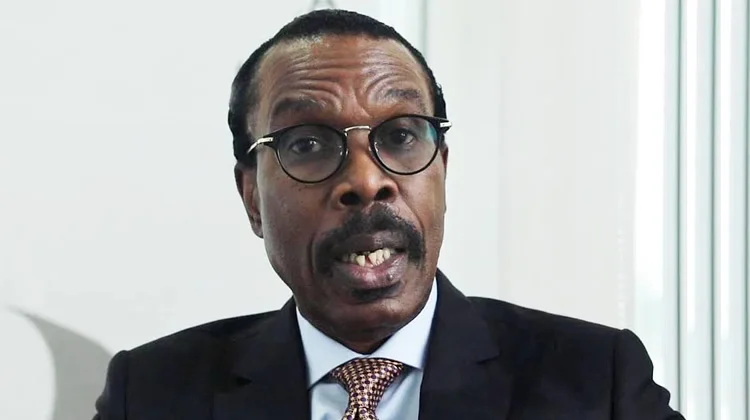Chief Executive Officer of Financial Derivatives Company, Bismarck Rewane.The Managing Director of Financial Derivatives Company Limited, Bismarck Rewane, has criticised the allocation of three per cent share for oil-producing communities in the just assented Petroleum Industry Bill 2021.
The economist, who spoke on Monday night while featuring on Channels Television’s ‘Politics Today’ programme monitored.
He said with the passing of the bill into law on Monday without addressing certain contentious sections, the country has short-changed and raped the oil-producing communities in the Southern region of Nigeria.
Earlier reported that the President Muhammadu Buhari signed the bill into law on Monday after it stalemated for about 20 years in the National Assembly.The 17 Southern governors, the Pan Niger Delta Forum, and other groups in the South, had widely criticised some provisions of the PIB, describing the 3% share for host communities as paltry, and the 30% profit share for oil exploration in the frontier basins, mostly in Northern Nigeria, as humongous.
At the moment, crude oil is obtained from eight states in the Niger Delta region which include: Abia, Akwa Ibom, Bayelsa, Delta, Edo, Imo, Ondo and Rivers States.
Speaking on Monday night, Rewane said it is unfair that the host communities suffer the environmental degradation and economic difficulties caused by oil exploration yet are allocated 3% profit share while the money from oil explored in the Niger Delta is used to develop other parts of the country.The economist, who said an imperfect bill is better than no bill at all, highlighted four key parts of the just-assented PIB: governance, fiscal framework, the monetisation of gas and gas incentives as well as profit allocation for host communities.
He said, “An imperfect bill is better than no bill and better late than never. But what we need to understand is that there are four major elements of this bill. One is the governance, NNPC (Nigerian National Petroleum Corporation) will be incorporated into a commercial venture, as a matter of fact, NNPC announced recently that they will be paying their first dividends in September this year. There will be two regulatory bodies – one for the upstream and one for the downstream.
“The governance is there and there will be the incorporated joint venture. So, Nigeria’s investment will be covered by a joint venture just like the NLNG (Nigerian Liquefied Natural Gas) model. So, that brings an end to the abuse by NNPC officials in the running of the company.
“The fiscal framework which are the incentives which will encourage people to invest, both domestically and internationally in this whole spectrum is important.
“Oil contributes 10 per cent of our GDP but it contributes 75 to 80 per cent of our foreign exchange earnings, 70 per cent of our fiscal revenues and when we take LNG and add it to oil, we’ll have 95 per cent of revenues. So, directly or indirectly, this is the goose that lays the golden egg. We’ve got to nurture it even though the obsolesce of oil is a declining function of time right now. Two, the irrelevance of OPEC (Organization of the Petroleum Exporting Countries) is staring at us, so, we have to make hay while the sun is shining even though the cloud is overcast.
“We also have the monetisation of gas and gas incentives so that the royalties brought down and therefore people will invest in gas because Nigeria is more of a gas producer than an oil producer. When you look at that, we have to harness that and use it, especially now that because of the Climate Accord, European Banks and National Banks are told not to lend money to those pursuing fossil fuel.
“Finally, the big elephant in the room; the host communities and the 3 per cent allocation. Is the 3 per cent the ideal, optimal compensation for the host communities, I will say, ‘No’, because I come from there but at the same time, what is more important for the oil communities is the transparency of the money that is spent and the impact it has rather than having a tea party.
“I am not sure that it is fair for the oil-producing communities who suffer – if you go there, compared to other parts of the country where they produce no oil and see the level of affluence, there are multi-dimensional theft and degradation in the host communities. It is rape and that is what is happening but an imperfect bill is better than no bill.
“Issues are going to be seriously debated in the host communities and the problem is that a time between misunderstanding and violence which maybe 12 months or six months is much shorter today, you will find that misunderstanding and violence, squabbles and political disruptions is going to be the bane of this thing because everybody in town is going to want to be a traditional ruler.”
Rewane described the presidential assent to the bill as “symbolic” but said the host communities have been short-changed and ripped off with the 3 per cent profit share.
“It is symbolic that this bill has assented into law. Now, what are we going to do to amend it to make it fair, equitable, optimal? That is the challenge of the lawmakers. Mind you, how many of the lawmakers come from the oil-producing communities? How many of the top echelons of the NNPC come from the oil-producing communities? So, the oil-producing communities have actually been short-changed, ripped off and that is why they resort, in most cases, to bunkering and so many of the dysfunctional activities there,” he stated.

